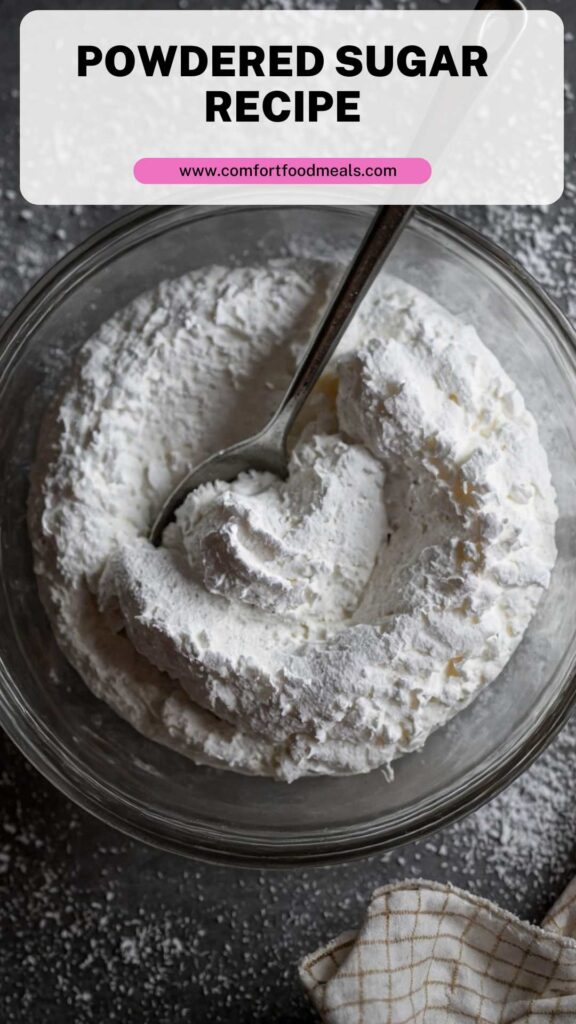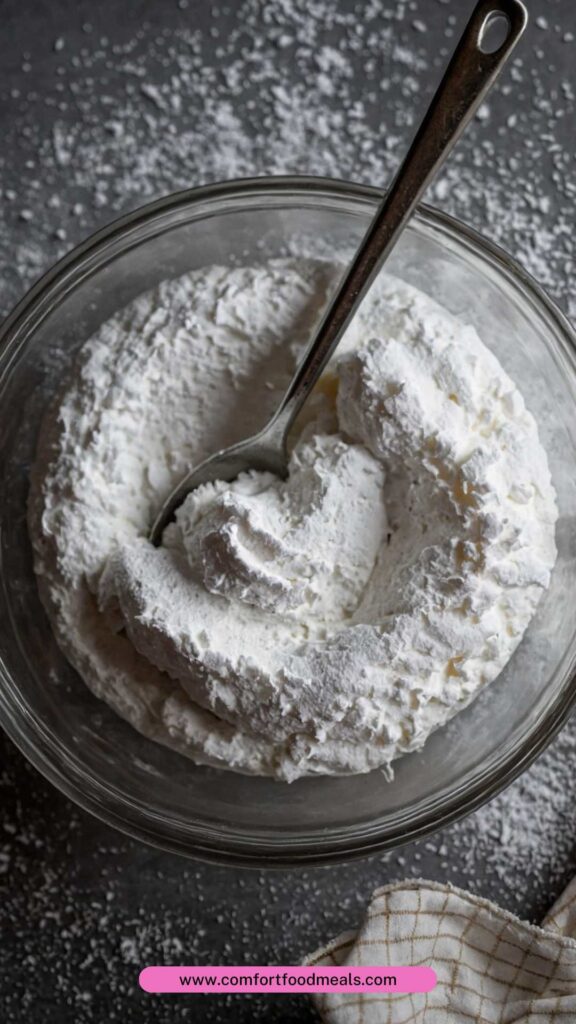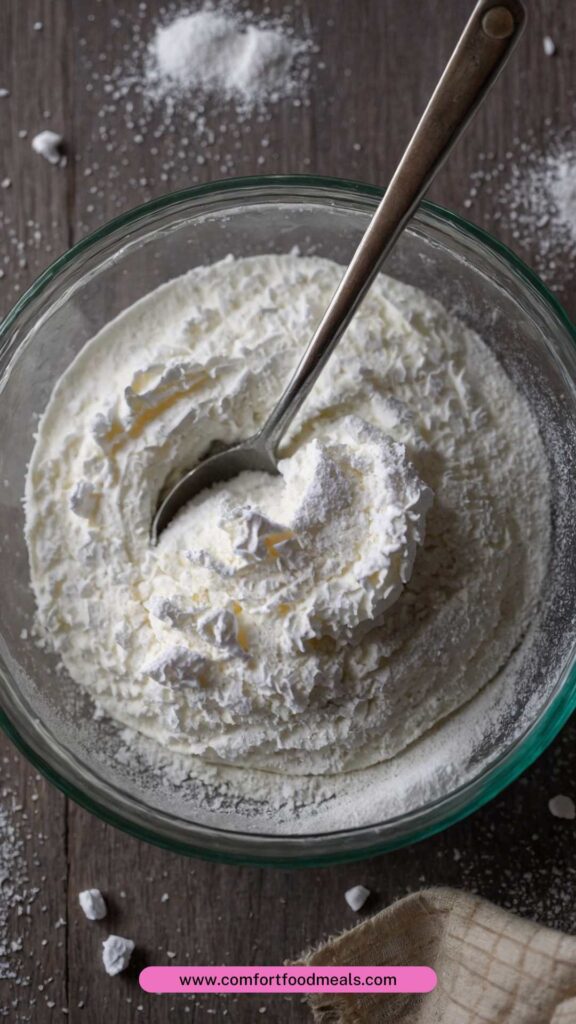When it comes down to sweetening or decorating our favorite dishes, powdered sugar shines brightly. I mean, who doesn’t love the soft dusting of powdered sugar on a warm donut or a slice of vanilla cake? It has this magical ability to instantly elevate desserts.
Pair it with fresh fruit, whipped cream, or even mix it into creamy frostings—there really isn’t a limit to its uses. Just think: a hot cup of cocoa sprinkled with powdered sugar on top. It creates a comforting experience that warms both your heart and your senses.

As a dietitian and food blogger, I’ve had my fair share of kitchen experiments, but creating powdered sugar from scratch is a game-changer. It’s surprisingly simple, and the end result is often more wholesome than store-bought versions.
Ingredients show their true colors when you make things yourself. Let’s dive into the ins and outs of making powdered sugar while sprinkling in some personal anecdotes from my kitchen adventures!You Might Also Like These Recipes!
What is Powdered Sugar?
So, what exactly is powdered sugar? It’s simply granulated sugar that has been finely ground into a soft powder. Often mixed with a tiny amount of cornstarch, it prevents clumping.
Usually, it’s used for icing cakes, making candies, or serving as a lovely garnish on various desserts. Its texture gives the sweet boost a unique melt-in-your-mouth quality.
What is the Flavor Profile of Powdered Sugar?
In terms of flavor, powdered sugar can be described as sweet, but there’s more to the story. Unlike regular sugar, it’s not just about that immediate sweetness.
When you sprinkle it on pancakes or blend it into frosting, its fluffy texture adds airiness while complementing other flavors.
The subtle hint of cornstarch mellows the sweetness slightly, making it balanced and perfect for creating smooth, rich textures in your recipes.
Why You’ll Love This?
You are going to adore making powdered sugar at home. First off, you control the ingredients. It’s ideal for anyone avoiding additives.
Second, the freshness of homemade powdered sugar is unmatched. When you mix it into your recipes, it brings a lovely sweetness without an overwhelming aftertaste. Plus, it’s cheaper than buying small bags at the store.
Ingredients
1/4 teaspoon fine sea salt
2 tablespoons cornflour
2 cups white granulated sugar
1 teaspoon vanilla powder
Step-by-Step Instructions
Step 1: Prepare Your Equipment
Start by gathering your equipment. You’ll need a blender or food processor. This is crucial! Regular blenders or even coffee grinders can work well, too. Ensure you have a fine sieve or sifter handy for the perfect texture after blending.
Step 2: Combine Ingredients
In the blender, add the 2 cups of white granulated sugar. Follow this with the 2 tablespoons of cornstarch and 1/4 teaspoon of fine sea salt. If you’re feeling adventurous, throw in 1 teaspoon of vanilla powder.
This optional addition can provide a lovely aroma and subtly enhances flavor.
Step 3: Blend Until Fine
Now, secure the lid and blend the mixture on high speed. This step is essential for cornering that silky smooth texture.
You should blend it until the sugar turns into a fine powder. Depending on your appliance, this could take anywhere from 30 seconds to a couple of minutes. Keep an eye on the texture!
Step 4: Sift for Uniformity
After blending, you will have a fine dust. But a little love goes a long way! Pour the blended mixture through a fine sieve or sifter into a bowl.
This will ensure that any granules that may have escaped the blending process are removed. If you find any lumps, toss them back into the blender for a quick second round.
Step 5: Store or Use
Your powdered sugar is ready! Use it immediately for frosting, dusting, or any culinary creation. But if you have leftovers, make sure you store it in an airtight container. A glass jar works beautifully!

Tips & Tricks
– Use a High-Powered Blender: The smoother the blend, the better the consistency. Don’t skimp on power!
– Allow It to Rest: Once blended, let it rest in the blender for a few moments to settle before sifting. This helps prevent sugar clouds in your kitchen.
– Sifting Helps: Don’t skip the sifting step! It makes a world of difference in texture.
– Flavor Exploration: Experiment with different extracts for different flavor profiles. Almond or coconut extracts work wonders!
– Keep It Dry: Store your powdered sugar in a cool, dry place to avoid humidity. This helps prevent clumping.
Nutrition Information
Powdered sugar nutrition facts

How Can You Store This Powdered Sugar?
Once you’ve created your delightful powdered sugar, it needs a cozy home. Use an airtight container to keep moisture out and store it in a cool, dry cupboard or pantry.
Properly sealed, it can last for a few months without losing its texture and flavor.
If Some Ingredients Are Not Available, What Are Some Alternatives?
Here are a few alternatives if you’re missing some ingredients:
– Granulated Sugar: If you have raw sugar (like Turbinado), you can use it, but it might not blend as smoothly.
– Cornstarch Alternatives: Arrowroot powder is a great replacement for cornstarch. It has similar thickening properties and won’t alter the taste much.
– Homemade Vanilla Powder: If you don’t have vanilla powder, you can use vanilla extract (about 1 teaspoon should do) but reduce the liquid in your recipe slightly to balance it.
Conclusion
Making powdered sugar is as easy as pie! It opens the door to creativity in the kitchen. Whether you’re topping a dessert or mixing it into frosting for that joyful cake, the fresh flavor and smooth texture will make your baking happier.
So next time you reach for that bag of store-bought powdered sugar, remember this journey we had together. Challenge yourself to try making it at home. Trust me—your taste buds will thank you! Happy baking!
You Might Also Like These Latest Recipes!

Powdered Sugar Recipe – Comfort Food Meals
Description
As a dietitian and food blogger, I've had my fair share of kitchen experiments, but creating powdered sugar from scratch is a game-changer. It's surprisingly simple, and the end result is often more wholesome than store-bought versions.
Ingredients
Instructions
Step 1: Prepare Your Equipment
-
Start by gathering your equipment. You’ll need a blender or food processor. This is crucial! Regular blenders or even coffee grinders can work well, too. Ensure you have a fine sieve or sifter handy for the perfect texture after blending.
Step 2: Combine Ingredients
-
In the blender, add the 2 cups of white granulated sugar. Follow this with the 2 tablespoons of cornstarch and 1/4 teaspoon of fine sea salt. If you’re feeling adventurous, throw in 1 teaspoon of vanilla powder.
-
This optional addition can provide a lovely aroma and subtly enhances flavor.
Step 3: Blend Until Fine
-
Now, secure the lid and blend the mixture on high speed. This step is essential for cornering that silky smooth texture.
-
You should blend it until the sugar turns into a fine powder. Depending on your appliance, this could take anywhere from 30 seconds to a couple of minutes. Keep an eye on the texture!
Step 4: Sift for Uniformity
-
After blending, you will have a fine dust. But a little love goes a long way! Pour the blended mixture through a fine sieve or sifter into a bowl.
-
This will ensure that any granules that may have escaped the blending process are removed. If you find any lumps, toss them back into the blender for a quick second round.
Step 5: Store or Use
-
Your powdered sugar is ready! Use it immediately for frosting, dusting, or any culinary creation. But if you have leftovers, make sure you store it in an airtight container. A glass jar works beautifully!
Nutrition Facts
Servings 4
- Amount Per Serving
- Calories 210kcal
- % Daily Value *
- Sodium 1mg1%
- Total Carbohydrate 54g18%
- Sugars 49g
* Percent Daily Values are based on a 2,000 calorie diet. Your daily value may be higher or lower depending on your calorie needs.
Note
- Use a High-Powered Blender: The smoother the blend, the better the consistency. Don’t skimp on power!
- Allow It to Rest: Once blended, let it rest in the blender for a few moments to settle before sifting. This helps prevent sugar clouds in your kitchen.
- Sifting Helps: Don’t skip the sifting step! It makes a world of difference in texture.
- Flavor Exploration: Experiment with different extracts for different flavor profiles. Almond or coconut extracts work wonders!
- Keep It Dry: Store your powdered sugar in a cool, dry place to avoid humidity. This helps prevent clumping.


